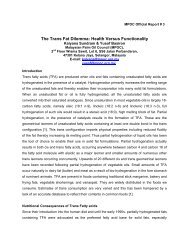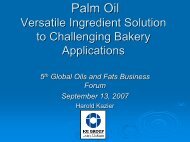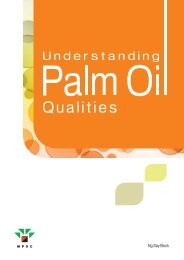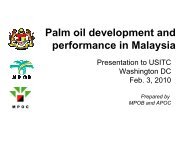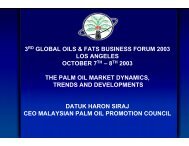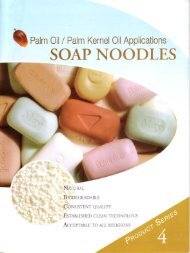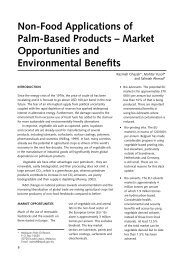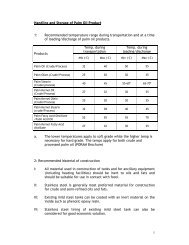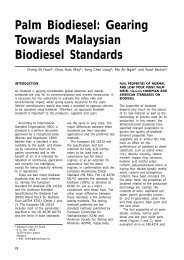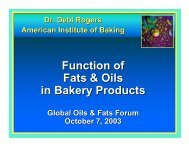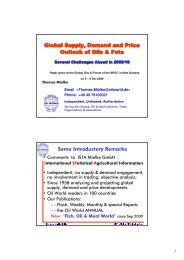Create successful ePaper yourself
Turn your PDF publications into a flip-book with our unique Google optimized e-Paper software.
Fabricated issueThe entire anti-saturated fat campaignwas fabricated to appear as a healthissue. Polyunsaturated vegetable oils werepromoted as healthy alternatives becausethey don’t raise blood cholesterol.Despite a long history of safe andeffective use, palm oil came under attackin the 1980s by a commercial lobbyagainst tropical oils. Even in countrieswere such oils were produced and widelyused, people were initially frightened intobelieving these were dangerous.In June 1988, congressional hearingswere held in the United States to settlethe tropical oils issue. The domesticvegetable oil industry had their ‘experts’testify about the dangers of tropical oils.Lipid researchers not on the payrolls ofthe vegetable oil industry were alsocalled in. Dr George Blackburn, aHarvard Medical School researcher,testified that these oils do not have aharmful effect on blood cholesteroleven in situations where they serve asthe sole source of fat.It was pointed out that palm andcoconut oils have been consumed as asubstantial part of the diet of manygroups of people for thousand of yearswith absolutely no evidence of anyharmful effects.At the end of the hearings, the evidenceagainst the tropical oils didn’t stack up,and no health warning went into effect.Companies that had placed the ‘notropical oils’ claim on products were toldto remove it, because of theunsubstantiated health claim.Researchers familiar with palm and coconutoils couldn’t understand all the criticism.Studies clearly showed that the tropical oilsdo not promote heart disease. If anything,they help protect against it.To all those whoknew the facts about these oils, this was nota health issue at all, but a profit motivatedpublicity campaign.Dr C Everett Koop, then US Surgeon-General, called the tropical oil scare“Foolishness!” and added “but to get theword to commercial interests terrorisingthe public about nothing is anothermatter”.When restaurants and food producersmade the switch, the public assumed thatsaturated fats were being replaced by‘heart friendly’ vegetable oils. What thepromoters conveniently failed tomention was that these werehydrogenated vegetable oils – theunhealthiest fat in the human diet. Thepublic had been deceived.The problem with hydrogenated oils isthat, during the hydrogenation process,polyunsaturated fats are transformed intotrans fatty acids (TFA) – toxic artificialfats. By 1990 a number of studies wereemerging showing that TFA promotesheart disease, diabetes, auto-immunedisease and a host of other healthproblems.“These are probably the most toxic fatsever known. It looks like trans fatty acidsare two to three times as bad assaturated fats in terms of what they do toblood lipids,” said Walter Willett, MD,professor of nutrition at the HarvardSchool of Public Health.Dr Willett and his colleagues at HarvardUniversity estimate that the consumptionof TFA in the <strong>American</strong> diet causes up to228,000 heart attacks each year.GLOBAL OILS & FATS BUSINESS MAGAZINE • VOL.5 ISSUE 1, 200825



